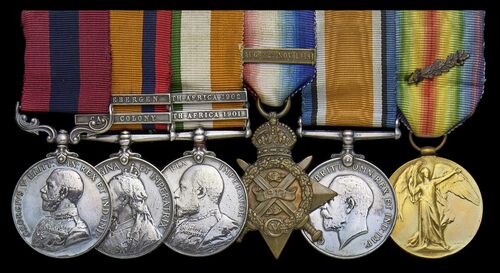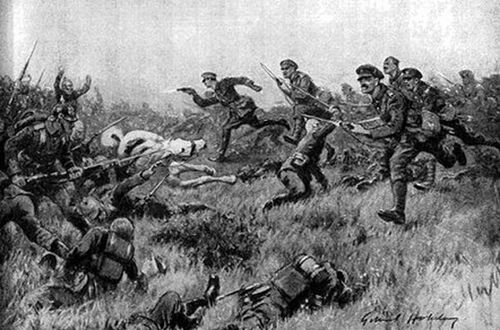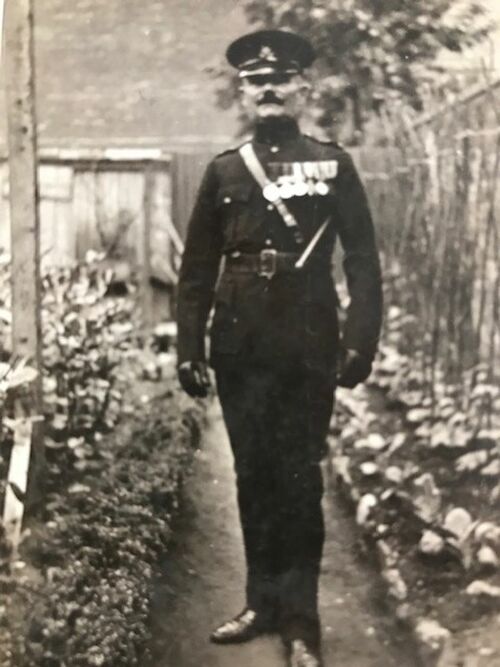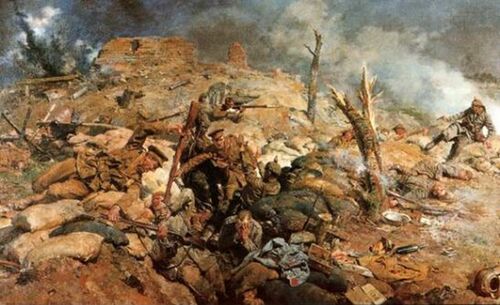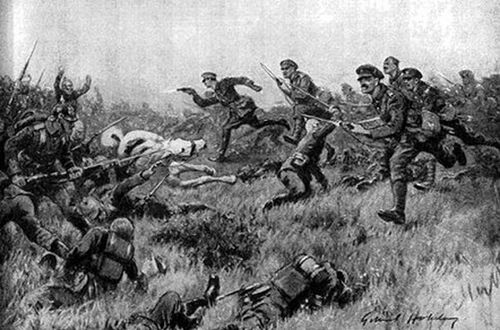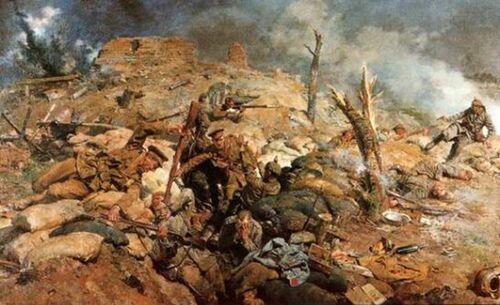Auction: 24002 - Orders, Decorations and Medals
Lot: 160
A Great War D.C.M. group of six awarded to Lieutenant F. G. Morgan, Worcestershire Regiment
Distinguished Conduct Medal, G.V.R. (5174 C. S. Mjr: F. G. Morgan. 1/Worc. R.); Queen's South Africa 1899-1902, 2 clasps, Cape Colony, Wittebergen (5174 Corpl: F. Morgan. Worcester : Regt); King's South Africa 1901-02, 2 clasps, South Africa 1901, South Africa 1902 (5174 Serjt: F. Morgan. Worcester: Regt); 1914 Star, clasp (5174 C.S.Mjr F. G. Morgan. 1/Worc: R.); British War and Victory Medals, with M.I.D. oak leaves (2. Lieut. F. G. Morgan.), mounted as worn, some light contact marks throughout otherwise very fine (6)
D.C.M. London Gazette 11 March 1916:
'For conspicuous gallantry and good work. He has allows shown zeal and courage and has often mended wire at night in front of the trenches, and on one occasion he brought his Company out of action.'
M.I.D. London Gazette 22 June 1915.
Frederick George Morgan was born in Spring 1879 in the district of Malmesbury, Gloucestershire. He enlisted into the Worcestershire Regiment in Birmingham on 13 April 1898, his trade at the time was a Waggoner. Morgan was posted to the 1st Battalion, Worcestershire Regiment arriving at the Depot on 15 April 1898. He seemed to be suited to military life and gained continual promotions at a relatively early age and readily accepted responsibility. He was promoted Lance-Corporal on 11 November 1899.
As the Boer War broke out in South Africa, a number of regimental men with riding experience and whose musketry accuracy was good, were seconded to Mounted Infantry Units. Morgan sailed for Cape Town on 18 March 1900 and was a draft of 20 men under Lieutenant R. M. Carr from the 1st Battalion who joined the 5th Mounted Infantry at Bloemfontein on 20 April. Morgan remained with the Mounted Infantry throughout the Boer War, seeing action during the operations in the Orange Free State, April-May 1900, including the actions at Thoba Mountain, Vet River (5-6 May1900), and Zand River operations in Orange River Colony, May to November 1900, including actions at Wittebergen (1-29 July1900), Ladybrand (2-5 September1900), Bothaville, and Caledon River (27 September -19 November 1900); operations in the Orange River Colony, November 1900 to March 1902; and operations in Cape Colony, February to March and September to October 1901 and operations up to May 1902.
He was promoted to Corporal on 22 August 1900; to Lance Sergt. on 15 November 1902 and finally returned from South Africa on 2 April 1903. He was promoted Sergeant on 20 November, the same year.
He was made Sergeant Cook on 14 April 1904 and completed his School of Cookery at Aldershot on 16 April. His Musketry Course was completed in June 1906 and his swimming course in October 1913.
He finally relinquished his position as Sergeant Master Cook on 1 January 1911 and was promoted Colour Sergeant on 16 August 1912. Posted to Egypt on 22 January 1913, Morgan was promoted Company Sergeant-Major on 1 October 1913. Here the 1st Battalion was to remain until the outbreak of the Great War. The 1st Battalion embarked for Home shores from Alexandria on 30 September, arriving at Liverpool on 16 October and entraining for Winchester the following day. Two weeks of training followed and then the Battalion, (part of the 8th Division), sailed for France on 5 November, arriving at Le Havre the next day, but being retained on ship for two days.
The 1st Battalion finally took up front line trenches facing Neuve Chapelle on 14 November and on the morning of the next day, in quite exposed positions, (the Trenches were very primitive at this time and not well constructed and were really not more than sunken depressions), with very little shelter, came under a heavy bombardment. The Battalion received its first casualties, (13 killed, 1 Officer and 26 ranks wounded).
The extreme cold also played a big part in the casualty listings - acclimatisation proved difficult, having moved from Egypt to northern France in deep winter and took its toll, with many suffering from severe frost bite.
Neuve Chapelle - March 1915
In February 1915, the British Commander-in-Chief decided that the First Army (on 1 January 1915, the British Expeditionary Force had been officially subdivided into two "Armies," commanded respectively by Sir Douglas Haig and Sir Horace Smith-Dorrien) should attack the German lines covering Lille, and before the end of that month preparations for the attack were begun. At first very little definite information was provided to the fighting troops: for it was desired to keep secret the time and place of the attack. But during the first days of March, 1915 the trenches in front of Neuve Chapelle held by the 1st Battalion Regiment were visited by a succession of officers of other Regiments, sent up to reconnoitre the ground; and when the Battalion was relieved and marched back from the front line to billets after dark on the 8 March, officers and men could not fail to notice that everywhere along the line of march they passed batteries of artillery either already ensconced behind farms and hedgerows or still noisily rumbling into position.
All the following day they lay in billets while orders for attack on the next morning were received and preparations were made. One of those preparations is perhaps of some little interest. In view of the uncertain weather the troops were to fight in greatcoats, the skirts of which were ordered to be fastened back in the French manner.
As planned, the attack was intended to crush the salient in the German line formed by the village of Neuve Chapelle, and thus to break a gap through the German defensive line. Through that gap the British reserves and cavalry were intended to push forward to seize the Aubers Ridge and possibly Lille itself. The 8th Division, which faced the Neuve Chapelle salient from the west, was to attack in the first phase, with the 23rd and 25th Brigades in front line and the 24th Brigade, which included the unit in Reserve. The leading Brigades were to capture the village. Then the 24th Brigade was to push through the village and past the northern end of the Bois du Biez on to the Aubers Ridge.
A great concentration of artillery had been arranged to support the attack, and elaborate preparations had been made. As part of these preparations the trench-mortar detachment of the unit (six trench-mortars with sixteen men) under Lieutenant E. B. Conybeare was stationed on the left flank of the front of the attack. Their fire was to assist in the reduction of a fortified building in the German front line known as the 'Moated Grange.'
The morning of 10 March 1915 was dull but fine and, apart from a few ranging shots, all was peaceful till, precisely at 0730hrs the massed British artillery, some five hundred guns, simultaneously opened fire.
That bombardment was the heaviest experienced till then in any conflict, and the troops in the British front line saw the German trenches which they had faced all the Winter disappear in a whirlwind of flame and smoke. For half an hour the German lines were bombarded: then the artillery lifted from the trenches to the village in rear, and the battalions of the 23rd and 25th Brigades clambered out of their trenches and advanced to the assault.
On the right of the 8th Division's front the battalions of the 25th Brigade met with but little opposition, and at 0830hrs they swept through the village. Further they could not go, for our own artillery were still bursting a curtain of shells between the village and the Bois du Biez. (It was in connection with the artillery fire on this line that the term "barrage" was first used officially in the British Army.)
A reconnoitring patrol (one subaltern and two men) from the unit had accompanied the leading battalions with orders to push on when they halted and reconnoitre the line over which the advance of the reserves was to be made. The shell-fire east of the village prevented the patrol from proceeding direct to the Bois du Biez: but by working round to the left. The patrol found a way along a lane to the Layes brook and thence to the ground north of the wood. Save for some stray bullets their advance was unopposed. The ground north of the wood was unoccupied by the enemy. After making a hasty reconnaissance of the ground in front, the patrol returned to the ruins of Neuve Chapelle Church to await the Battalion: for according to the original instructions the reserve Brigade was to pass through Neuve Chapelle at 0930hrs.
But the Battalion did not reach the Church. On the left the attack had not succeeded and the forward movement of the reserves was in consequence delayed. On the front of the 23rd Brigade the artillery bombardment had not succeeded in demolishing the enemy's defences; and the attacking battalions had suffered heavily in unsuccessful assaults. In support of the attack Lieut. Conybeare's trench-mortar detachment engaged a small redoubt which formed the apex of the salient in the German line near the "Moated Grange." The six absurd mortars fizzed and banged away merrily. One of them was hit by a shell, one blew up and another soon showed signs of following suit; but the remaining three mortars continued to fire. The enemy endeavoured to counter their bombardment by boldly hoisting a machine-gun on to the parapet, but on that machine-gun the mortars miraculously secured a direct hit. Then the Germans tried to break out from their redoubt, but Lieut. Conybeare himself shot down one officer and three men; and the remainder abandoned the attempt. Finally the survivors of the garrison of the redoubt put up the white flag: a great triumph for the despised "Archibalds" (Conybeare was awarded the M.C.).
It was after noon before the redoubt surrendered. By that time, after much confused fighting, the 23rd Brigade had succeeded in capturing all the German trenches opposed to them. Lieut. Conybeare then moved off with the remnants of his mortar battery and rejoined the Battalion. The unit had moved forward from their billets at 0900hrs down the main La Basse road, but before the old British front line was reached orders were received to halt at the cross-roads at Rouge Croix. There the Battalion waited till 1100hrs when a move was made forward to the old trench line. There again a halt was ordered and a long delay took place, the Battalion fretting in idleness until 1400hrs.
In front of them the open ground around the village was dotted with working parties, with wounded men walking back and with the usual debris of battle; while in every direction German shells were bursting. The general situation was unknown, and neither the British reserve battalions nor their commanders were aware of the golden opportunity which was being wasted. The stubborn resistance of the enemy on the northern flank near the "Moated Grange" was paralysing the attack, and the open gap north of the Bois du Biez had not been exploited. The fighting on the left flank continued, and orders were received that the Battalion was to send forward two companies to reinforce the troops of the 23rd Brigade at a captured redoubt. Accordingly, 'B' and 'C' Companies of the Battalion, under the Second-in-Command, Major J. F. S. Winnington, moved off in extended order across the open to that redoubt. They occupied the redoubt and held it for two hours under heavy fire and with no slight loss; Captain Linton was wounded, Lieut. Benningfield killed, and Lieut. Matthews and many of the rank and file were hit. The lives of three men who fell wounded in the open were saved by Lance-Corporal R. Blakeman, who at great risk dragged them under cover - Blakeman was awarded the D.C.M..
Presently the fighting round the orchard died down. The two companies were ordered to rejoin the 24th Brigade, and returned to the Battalion. The short spring day was drawing to a close before orders came (1620hrs according to the Divisional account; 1730hrs according to the Battalion Diary) at last for the 24th Brigade to advance: not towards Neuve Chapelle village but eastwards past the north of the village towards Pietre. The Brigade moved forward into the gathering dusk. Hedges and ditches made progress difficult and troops of the 7th Division crossed the line of advance (the reserve Brigade of the 7th Division was endeavouring to wheel northwards). Consequently, there were many checks and much difficulty in keeping direction. Eventually, as darkness fell, the leading companies approached a group of cottages and were brought to a stop by bursts of rapid fire. There was some confused movement and much firing. Orders were passed down to entrench, and the troops scraped cover with their entrenching implements in the heavy clay. Two companies formed the front line under Major Winnington, the other two being held back by Colonel Wodehouse in support. The attack of the morning had taken the enemy by surprise, and had actually effected that break in his defence for which the British staff had hoped. When the reconnoitring patrol of the Battalion had reached the open country north of the Bois du Biez there had been no enemy troops there to oppose an advance; but the opportunity had been missed, and in the ensuing delay the enemy had been able to bring up reinforcements and to establish a defensive line, based on a chain of works previously constructed, from Mauquissart to the Bois du Biez. Throughout the night of 10 March the German infantry (the 15th Infantry Regiment and the 11th Jager Battalion were opposing the 24th Brigade) worked hard to complete their defences, and by dawn they were entrenched and protected by wire along their whole front. But on the British side the arrangements for communication between the fighting troops and the staff had not been adequately thought out and had already broken down. The intermingling of units and the advance in the darkness had caused general confusion and loss of direction and during the night the troops in the front line received no orders as to any further advance. In default of instructions they busied themselves in providing such cover as could be improvised against the continuous shell-fire.
No orders, we have said, reached the troops in the firing line; nevertheless orders for an attack early next morning had in fact been made out. At 0645hrs the British artillery were to reopen the bombardment and then the infantry were to assault. Those orders reached the Batteries but not the Battalions; consequently the British artillery again opened a heavy fire against what they believed to be the German positions. Unfortunately the information at the disposal of the British gunners as to the line held by the enemy was inaccurate (the mistake as to the actual position of the 24th Brigade was the cause of that failure) and the British shells fell far beyond the new German trenches. On the other hand the German batteries, possessed of accurate knowledge of the situation, were able effectively to sweep all the ground about the positions held by the 24th Brigade.
Communication between Battalion Headquarters and the front line was difficult to maintain; but Company-Sergeant-Major H. Webb - who took the D.C.M. - bravely carried several messages forward to the companies at great risk under the heavy fire.
During the morning, in spite of the absence of orders, the British front-line troops made several attempts to advance: but those attempts were withered by the enemy's fire. No definite orders reached any Battalion of the 24th Brigade until 1430hrs, when Colonel Wodehouse was informed that a fresh general attack was to be made at once: he was instructed to give immediate orders for attack and to push his two reserve companies up to the front line, in the hope that the impetus they would bring would be sufficient to carry the front line forward to the assault. Accordingly, "A" and "D" Companies advanced over ground raked from front and flank by the enemy's fire. The advance was made most gallantly, but most of the officers and men of the two companies were shot down and the survivors were unable to do more than reinforce the companies in the forward trenches. They brought with them however the definite order that an immediate advance was to be made. On learning this, Major Winnington sent a message to the Northamptonshire, informing them of the order and asking them to conform to his attack. Then as a preliminary movement he ordered one platoon from each of "C" and "D" Companies to advance and seize a line indicated near the German trenches. The two platoons, led by Lieuts. Conybeare and Tristram, dashed forward in the most gallant manner through a concentrated machine-gun fire. They lost half their numbers, but the remnant followed the two subalterns to the line of a ditch within thirty yards of the German position. They held that ditch for half-an-hour under heavy fire, but no support came. The commanding officer of the Northamptonshire had replied to Major Winnington that it was useless to attempt an advance against such a strong position as yet undamaged by our artillery; and without the co-operation of the flanking battalion Major Winnington did not feel justified in ordering an advance.
Ammunition ran short in the front line, and Private E. Frazier volunteered to fetch a further supply. Under a heavy fire he made his way back to the support trenches and returned laden with bandoliers, coolly working across the open from one shell-hole to another (Frazier was awarded the D.C.M.).
Eventually, at 3 p.m., the British artillery, at last correctly informed of the location of the enemy's trenches, shortened their range with disastrous results, for the first three shells crashed into the two gallant platoons lying out in front. All except six men and the two subalterns were killed or wounded, and Major Winnington, seeing that their position was hopeless, signalled them to retire. By a miracle the eight survivors reached the trenches unhurt.
To the right of the Sherwood Foresters had attacked, and had succeeded in gaining possession of some ruined buildings slightly in advance of the right flank of the Worcestershire; but that gain of ground was accomplished only at the cost of heavy casualties, especially in officers. Night fell, but the shelling did not cease, and in the darkness the weary troops worked hard to improve the muddy ditches which constituted their defences. Battalion HQ was brought forward to near the front line and the Battalion was reorganised. "B", "C" and "D" Companies were now in front line, with "A" Company in support to the right flank of the line.
It was not only the British who were using the hours of darkness to good advantage. The German line opposite was filling up with fresh troops. Reserves had arrived to help the original defenders, and German Headquarters had now determined to retake the village of Neuve Chapelle at dawn the next morning. Opposite the line held by the 24th Brigade a fresh Regiment of Bavarians was brought up for the assault. After a chilly and miserable night the first daylight of 12 March filtered down through a thin white mist. Before the dawn the enemy's artillery had heavily shelled the ground around the British trenches; now they increased their range.
Almost at once came the sound of rapid firing both from the Northamptons on the left and the Foresters on the right. Then through the mist a dense mass of attacking infantry came surging forwards against the trenches held by the unit. The attackers were two Battalions of the 21st Bavarian Reserve Regiment in close formation, with a mounted officer riding in their midst. 'On they came in a great mass,' wrote a Subaltern, 'their officers in front waving swords, then a great rabble followed by a fat old blighter on a horse.'
All along the line the men gripped their rifles and awaited the order to open fire: after two days of muddle and failure the moment for which they had trained had come at last. On the right the Foresters suddenly fell back. The little salient which their line formed had been attacked from both sides and broken in. The right company of the Foresters had been forced back on their supporting line and their left company now also retired, leaving the right flank open. That sudden retirement of the troops on their immediate right might have unnerved younger troops; but the old Battalion remained unshaken. "A" Company swiftly formed to the right to face the opened flank and the abandoned trenches of the Foresters. "There was a most extraordinary hush for a few seconds as we held our fire," said an officer, "while they closed in on us." The Germans came on to within seventy yards. Then at last from flank to flank the whole line of the Worcestershire broke into the crackling roar of rapid fire - the "mad minute," so assiduously practised, "We brought them down in solid chunks," wrote one subaltern, "Down went the officers, the sergeant-majors and the old blighter on the horse." Then, as the German battalions reeled under the storm, the Worcestershire broke from their trenches and charged with the bayonet. "We counter-charged...and back the rabble went, full tilt for their own trenches 400 yards away".
On the right "A" Company, gallantly led by Captain J. H. M. Arden, charged along the line of the Foresters' abandoned trenches straight into the thick of the enemy, " scattering them like fowls". The ruined buildings were retaken with the bayonet, and " A " Company pursued the enemy some distance to the right beyond the Foresters' position into an orchard on the far side of a country road. " The Worcesters had a fine scrap with the Germans in an orchard round a farmhouse," wrote a newspaper correspondent (The Times, 19 April 1915, refers).
" The Worcesters had their tails up with a vengeance. They chased the Germans up and down that muddy field like terriers after rats. They pursued them with the bayonet round the trees."
If other troops had been available to support that isolated company the German defensive front might have been broken ; but the Foresters had lost nearly all their officers, and were unable to do more than reoccupy their old line. " A " Company held the orchard till about 1100hrs and then withdrew behind the Foresters to reorganise.
Meanwhile further to the left, the other three companies of the Battalion after a fierce bayonet fight had pursued the beaten enemy into their own lines. As his men flooded forward across the open, Colonel Wodehouse sent a message (that message is recorded by 24th Brigade Headquarters as having been received at 6.33 a.m.) to 24th Brigade Headquarters saying that the Battalion was advancing and asking that the artillery might be warned. Had the Brigade acted at once, and had reinforcements followed in the wake of the Worcestershire, much might have been accomplished. As it was, the Battalion stormed the buildings in front and prepared to hold them against the expected counter-attacks. No support came, and the British artillery intermittently bombarded the captured buildings. Further to the left the Northamptonshire had made an attempt to follow up the enemy's retirement; but heavy loss brought their attack to a standstill, and in the mist the Worcestershire were not aware of their movement.
In their isolated position they held firm. One counter-attack after another was beaten off. At last, about 1000hrs, it became clear that the position of the Battalion, far in advance of the remainder of the Brigade, encircled by the enemy on three sides and shelled by both artilleries, was no longer tenable. Reluctantly Colonel Wodehouse gave orders for the Battalion to fall back to the former line.
The ground across which the retirement had to be made was open and level, and on both flanks the enemy were strongly posted. The three companies fell back in good order by alternate platoons, each unit doing its best to cover by fire the movement of the others; but under the crossfire of the enemy's machine-guns the platoons withered away. Officers and men fell fast. The Commanding Officer, the Adjutant, and the last surviving Company Commander went down, and it was a mere remnant of the three stubborn companies which, still in good order and grimly firing, reached the trenches which they had held at dawn.
Outside the trenches the open ground was littered with dead and wounded. Many of the latter were dragged into safety by brave men who dashed out from the trenches and brought in their stricken comrades in spite of the enemy's fire. Great bravery was shown by Privates F. E. Riggs and J. Riley, both of whom, although wounded more than once, continued their work of rescue as long as their strength endured (both were awarded the D.C.M.).
The survivors of "A" Company were still away to the right, in the salient formed by the trenches of the Sherwood Foresters. The latter battalion had now hardly any company officers left, and, in consequence, their Commanding Officer ordered (about 1 p.m.) Captain Arden to organise a composite company, from his own men and such of the Sherwoods as he could muster, and with these to try to gain ground towards the enemy in the orchard. Captain Arden carried out his orders. He could collect no more than twenty of his own men and as many of the Foresters, but with these he again pushed forward to the attack, crossed the road, and once more cleared the orchard. Further advance was not possible, but he remained holding the orchard until late in the afternoon. Then, since no support had arrived, he withdrew, and with the remnant of his company he rejoined the Battalion (Captain Arden was subsequently awarded the D.S.O.).
Darkness closed in with heavy rain. About 9 p.m. came orders that a night attack on the enemy's position was to be made: the 2nd Devons were coming up to assist. The survivors of the 1st Worcestershire braced themselves for a further effort. By that time the platoons had shrunk to little groups of men led by junior N.C.O's. (Corpl. J. Tromans showed great skill and courage in leading his platoon after his officer had fallen ; he was subsequently awarded the D.C.M.); one company had lost all its officers and was commanded by the Company Sergeant-Major (Morgan, who was subsequently awarded the D.C.M.); but the fighting spirit still remained. The Devons came up in the darkness, plans were concerted, and from 2300hrs onwards the two Battalions lay out on the soaked ground awaiting the order to advance. But the order did not arrive: instead at 0300hrs, word came that the attack was cancelled and that they would withdraw into reserve. The Battalion (the Battalion was brought out of action by Major J. F. S. Winnington, who was awarded the D.S.O. for his cool and gallant leadership) moved back through the darkness.
With the cancelling of the orders for that night attack the Battle of Neuve Chapelle came to an end. The infantry of both sides were exhausted, and no fresh reinforcements were brought up to renew the fight. During the next three days the British and German artilleries kept up an angry fire. Then their activity died away, and the work of burying the dead and consolidating the new trench line proceeded without further interruption. The trenches which the unit had held against the Bavarian attack became part of the new line, while the ruined buildings which the Foresters had taken and which Captain Arden's charge had recaptured formed a salient which became known afterwards to many units of the Army as "The Duck's Bill."
Save for that gain of ground and for the proud memory of that bayonet fight there was but little profit visible to the Regimental officers and men from the Battle of Neuve Chapelle.
The losses had been terribly severe. The Battalion had lost over 370 of all ranks, including 19 Officers. The Commanding Officer, Lieutenant-Colonel E. C. F. Wodehouse, D.S.O. and the Adjutant, Lieutenant J. S. Veasey, a brilliant young officer, were among the dead. The Battalion had gone into action on the 10th March 1915, with a strength of 26 officers and 870 rank and file. On the morning of 13 March the whole Battalion could muster no more than 7 Officers and 450 men. Besides these losses many officers and men, including the Second-in-Command, Major J. F. S. Winnington, and Lieut. M. A. Hamilton Cox, were invalided after the Battle from the effects of the strain and exposure of the three days and nights of fighting. It may be of interest to note that the Butcher's Bill for their opponents, the 21st Bavarian Reserve Regiment, according to their official history, were 25 Officers and 1,139 other ranks.
For his gallantry during the battle, Morgan was awarded the D.C.M. and 'mentioned'.
On 26 December, 1915, Morgan was posted to the 1st/7th Battalion, Worcestershire Regiment as Acting Regimental Sergeant-Major. Around this time, the Battalion moved south from the Flanders area to the Somme. It saw no major fighting between January-June, 1916, for at that particular time, the Somme was regarded as a quieter region of the front.
In June 1916, Morgan received a battlefield Commission to the rank of 2nd Lieutenant and was posted to the 3rd Battalion, with the recommendation:
'The candidate landed in France with the 1st Battalion, The Worcestershire Regiment in November, 1914 and served with them for an unbroken period until appointed A/ R.S.M. of this Battalion on 28th December, 1915. His experience of actual fighting makes him especially qualified for a commission. He has been awarded the D.C.M. He is fit in all respects to assume at once, the duties of an officer in the field.'
Somme - Leipzig Salient, Thiepval
The 3rd Battalion were also in the Somme area and on 1 July 1916, as the major Somme offensive opened, were held in reserve at Varennes. Listening to the guns bombard the frontal areas, they gradually moved towards Aveluy Wood, reaching their sheltered trenches at 3am on 3rd July. No sooner had they reached the location, a terrific enemy bombardment opened up a mile in front of their position and it was soon learned that the attack on Thiepval had failed. As day broke, the rising ridge line ahead could be seen. Although the frontline German trenches had been captured, the tangle of support trenches were being fiercely contested by the enemy, as shell and machine fire was poured against the British troops who were then attacking the Leipzig Salient.
Before dawn on 5 July, the enemy made a large attack against their old front line trenches within the Salient, held by the Wiltshire Regiment. Although they withstood the attack and held on to the trenches, the casualties were high and at around midday, two companies of the 3rd Worcesters were sent to reinforce the Wiltshires. That evening, the Wiltshires made a counter attack and gained some ground, but the loss once more was high and another company of Worcesters were sent forward to supplement the Leipzig Salient positions. So it was that from 6-7 July, the two depleted Battalions remained within that tangle of damaged, waterlogged and muddy trenches, where possible and when ammunition arrived, making bombing attacks against the enemy's trench positions. The shelling and fire were relentless. Finally, on the 7 July, only 50 men of the Worcestershire Regiment remained - all the Officers had become casualties. The one remaining Worcestershire Company, plus HQ were sent forward too. At dusk, the remnants of the shattered Wiltshire and Worcestershire Regiments were finally relieved and went back into reserve.
It was on 7 July, that Morgan himself was severely wounded by a high explosive shell, receiving injuries to his chest, lung and back. He reported that he had led a raid on the "Hindenburg Dugout" in the Leipzig Salient at 0930hrs, killing 4 of the enemy and capturing a prisoner, when shortly after he was blown up by a shell. At the time of the incident, he also suffered bleeding from his nose and ears.
He arrived back in England on 19 July and so began a long period of treatment and recovery. Morgan appears to have left hospital and went on leave on 9 September 1916. Although his wounds had partially healed, some air was still not fully entering his lung, his left scapula had been fractured and he was unable to raise his left arm. He began to receive massage and electrical treatment, but this was unsuccessful. There is some suggestion that he was also suffering from depression and minor shell shock.
On 31 March,1917, in the belief that he qualified for his Army L.S. & G.C. Medal, which had obviously not been awarded, he wrote to the War Office. Major C. H. Frith replied on 3 May stating that although his gallantry and service in action, coupled with the award of the D.C.M. was admirable, under the regulations it did not impact on the award qualification. Clearly, this award was not granted due to two instances of drunkenness:
i)
Sergeant - Kilworth Camp, Ireland at 2320hrs, 31 July 1905 - Severely Reprimanded.
ii)
Company Sergeant-Major - Musketry Camp, Cairo at 1720hrs, 28 February, 1914 - Severely Reprimanded.
In May 1917, he was sent to carry out light home duties with the 6th (Reserve) Battalion, Worcestershire Regiment at Devonport. He was promoted to Lieutenant on 5 December, 1917, despite being on sick leave and continually receiving treatment. Morgan received further treatment at Ashton Court Officers Convalescence Hospital, Bristol and Southend Military Hospital in July 1919, but was still in some painful discomfort, suffering restricted left arm movement, headaches and depression.
On 10 June 1920, a Medical Board held that his condition had not improved, suffering from a 40% reduction in left shoulder rotation, with considerable muscle wastage (3/4) in his left arm and loss of power. Still suffering from head, chest and arm pains and loss of sleep, which also effected his nervous system. Classified as 80% disabled and unfit for any further military service. Morgan died on 23 January 1960 at Chard General Hospital; sold together with a small photograph of him in uniform wearing medals and assorted photocopied research.
Subject to 20% VAT on Buyer’s Premium. For more information please view Terms and Conditions for Buyers.
Sold for
£1,200
Starting price
£1200

